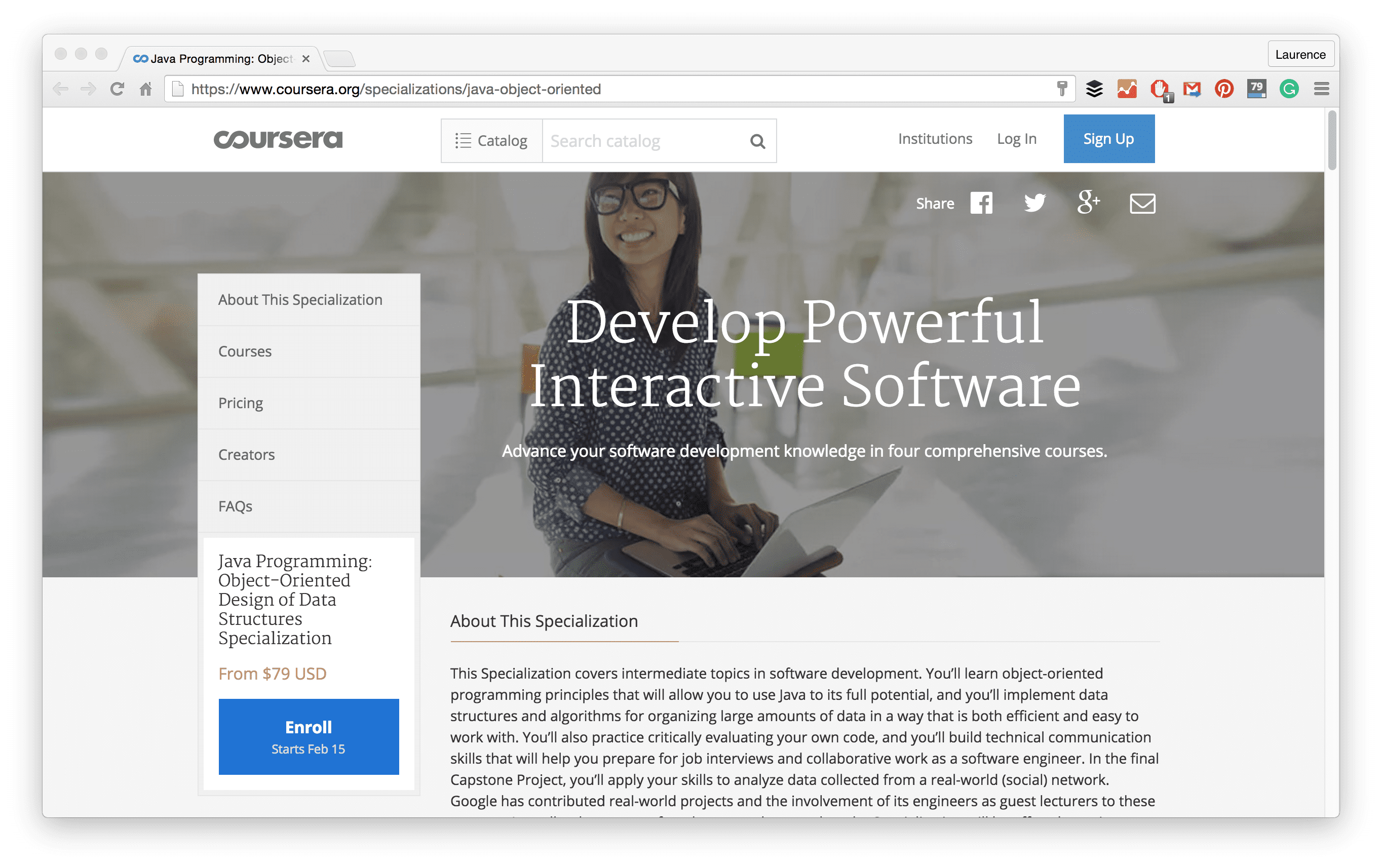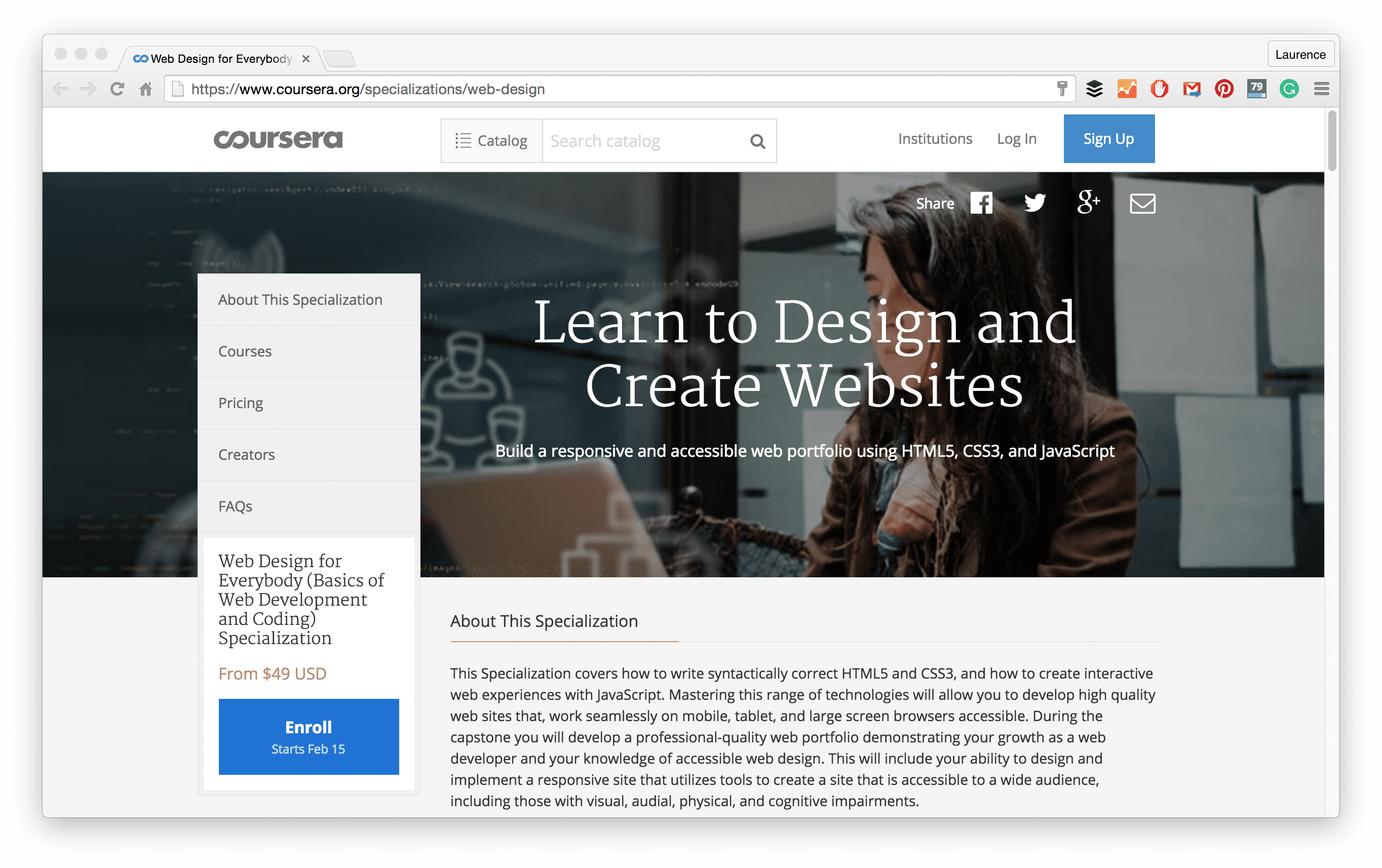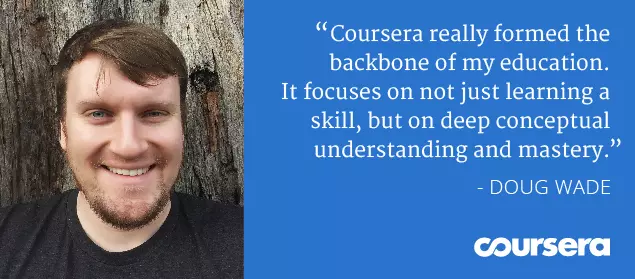When you’re trying to break into the tech industry (or move up the next rung on the ladder), nothing can sabotage you faster than being too general.
The fact of the matter is, nobody wants to hire someone who has a surface knowledge of ten coding languages and fifty tools. They want to hire experts who can skillfully handle a specific role.
That’s where Coursera comes in. Coursera is an online course platform with offerings from universities around the world. This is one of the things that differentiates it from other programs: real professors teach these courses.
The other thing that sets it apart is that more than just individual courses, Coursera offers specializations.
Are Coursera specializations worth it? What are some of the best tech-related Coursera specializations? In this post, we’ll share 12 top Coursera specializations and answer some common questions about Specializations at the end!
Disclosure: I’m a proud affiliate for some of the resources mentioned in this article. If you buy a product through my links on this page, I may get a small commission for referring you. Thanks!
What Are Coursera Specializations?
Coursera specializations are focused programs that allow students to develop expertise in a particular area.
At Coursera, courses that are part of Specializations are only available through subscription payments (ranging between $39–$79/month) or through Coursera Plus, which lets you pay an annual subscription of $399/year to access 90% of Coursera’s library.
Almost all specializations also end with a Capstone Project, where you get to apply your skills in a real-world situation. Upon completion of a specialization, you’ll receive a certification.
Start coding now
Stop waiting and start learning! Get my 10 tips on teaching yourself how to code.
Top 12 Coursera Specializations in Tech
Below are 12 popular specializations that relate to web development, programming, mobile development, and data science. Keep reading after the top 12 list for more information about the certification process at Coursera and whether a Coursera specialization certificate has any “real world” value.
Please note that pricing listed below may change in the future!
Specialization #1: Full Stack Web Development with Angular
➡️ URL: https://www.coursera.org/specializations/full-stack

Want to build fully functional web applications? Then this Full Stack Specialization is for you. Inside this specialization you will learn how to build complete web solutions using a variety of development tools. On the front end, you will learn HTML/CSS, JavaScript/JQuery, AngularJs and Bootstrap, among others. On the back end, you’ll learn how to implement NoSQL databases using the popular MongoDB while working in a Node environment.
As a bonus, this specialization will touch upon mobile app development using the Ionic framework and Cordova. The Capstone Project will allow you to create a “fully functional web and hybrid mobile application with back-end support.”
🎓 University taught at: Hong Kong University of Science and Technology
📈 Level: Intermediate (some related experience required)
💰 Price: $49/month with a Coursera subscription
💻 Courses:
- Front-End Web UI Frameworks and Tools: Bootstrap 4 (31 hours)
- Front-End JavaScript Frameworks: Angular (38 hours)
- Server-side Development with NodeJS, Express and MongoDB (48 hours)
Specialization #2: Java Programming and Software Engineering Fundamentals
➡️ URL: https://www.coursera.org/specializations/java-programming
This Coursera specialization is meant for beginner-level students wanting to learn the basics of developing software. Topics covered include algorithm development, data representation, debugging, HTML/CSS, JavaScript and Java.
It’s an ideal starting point for aspiring software engineers who wish to gain a better understanding of programming fundamentals. By the end, you’ll have created your own functioning mini-project.
🎓 University taught at: Duke University
📈 Level: Beginner (no prior experience required)
💰 Price: $49/month with a Coursera subscription
💻 Courses:
- Programming Foundations with JavaScript, HTML and CSS (33 hours)
- Java Programming: Solving Problems with Software (17 hours)
- Java Programming: Arrays, Lists, and Structured Data (14 hours)
- Java Programming: Principles of Software Design (13 hours)
- Java Programming: Build a Recommendation System (5 hours)
Specialization #3: Object Oriented Java Programming: Data Structures and Beyond
➡️ URL: https://www.coursera.org/specializations/java-object-oriented

This five-course specialization will further your existing programming skills by showing you how to develop interactive software using object-oriented programming principles. You will learn to maximize your Java skills and “implement data structures and algorithms” to efficiently organize large amounts of data. To take your skills up a notch, you’ll practice analyzing your own code–and to further increase your marketability, you’ll get experience in navigating the job search process as a software engineer.
🎓 University taught at: UC San Diego
📈 Level: Intermediate (some related experience required)
💰 Price: $49/month with a Coursera subscription
💻 Courses:
- Object Oriented Programming in Java (39 hours)
- Data Structures and Performance (42 hours)
- Advanced Data Structures in Java (29 hours)
- Mastering the Software Engineering Interview (21 hours)
- Capstone: Analyzing (Social) Network Data (18 hours)
Specialization #4: Data Structures and Algorithms
➡️ URL: https://www.coursera.org/specializations/data-structures-algorithms
If you are serious about pursuing a career in software engineering, this Coursera specialization is for you. It’s a deep-dive into algorithms—one of the toughest areas for newbies to grasp. This specialization will show you how to design as well as implement them. The specialization contains two real-world projects: Big Networks and Genome Assembly.
🎓 University taught at: UC San Diego
📈 Level: Intermediate (some related experience required)
💰 Price: $49/month with a Coursera subscription
💻 Courses:
- Algorithmic Toolbox (39 hours)
- Data Structures (25 hours)
- Algorithms on Graphs (55 hours)
- Algorithms on Strings (18 hours)
- Advanced Algorithms and Complexity (27 hours)
- Genome Assembly Programming Challenge (17 hours)
Specialization #5: Responsive Website Development and Design
➡️ URL: https://www.coursera.org/specializations/website-development
This specialization is a great primer for modern full-stack web development. In it you’ll study UX design, frontend development (HTML/CSS, JavaScript), the full-stack Meteor.js framework, and more. You will also explore advanced concepts such as APIs, data visualization, and animation. By the end (you guessed it) you’ll have built a functional interactive web page.
🎓 University taught at: University of London
📈 Level: Beginner (no prior experience required)
💰 Price: $49/month with a Coursera subscription
💻 Courses:
- Responsive Website Basics: Code with HTML, CSS, and JavaScript (25 hours)
- Responsive Web Design (26 hours)
- Introduction to Meteor.js Development (26 hours)
- Web Application Development with JavaScript and MongoDB (27 hours)
- Responsive Website Tutorial and Examples (24 hours)
- Responsive Website Development and Design Capstone (14 hours)
Specialization #6: Web Design for Everybody: Basics of Web Development & Coding
➡️ URL: https://www.coursera.org/specializations/web-design

This beginner-level Coursera specialization is perfect for those who want to learn web design and front-end development fundamentals. You will learn basic design principles, HTML5, CSS3, responsive design, and how to utilize JavaScript on the web. The final Capstone Project requires you to build your own professional portfolio.
🎓 University taught at: University of Michigan
📈 Level: Beginner (no prior experience required)
💰 Price: $49/month with a Coursera subscription
💻 Courses:
- Introduction to HTML5 (11 hours)
- Introduction to CSS3 (13 hours)
- Interactivity with JavaScript (9 hours)
- Advanced Styling with Responsive Design (11 hours)
- Web Design for Everybody Capstone (17 hours)
Specialization #7: Python for Everybody
➡️ URL: https://www.coursera.org/specializations/python
This five-course specialization will teach you fundamental programming concepts with Python. You’ll learn about data structures, how to access web data, and databases—all with Python. The specialization culminates in a Capstone Project where you’ll design and create your own application that can retrieve, process, and visualize data.
🎓 University taught at: University of Michigan
📈 Level: Beginner (no prior experience required)
💰 Price: $49/month with a Coursera subscription
💻 Courses:
- Programming for Everybody (Getting Started with Python) (19 hours)
- Python Data Structures (19 hours)
- Using Python to Access Web Data (19 hours)
- Using Databases with Python (15 hours)
- Capstone: Retrieving, Processing, and Visualizing Data with Python (9 hours)
Want to master Python?
Then download my list of favorite Python learning resources.
Specialization #8: iOS Development for Creative Entrepreneurs
➡️ URL: https://www.coursera.org/specializations/ios-development
This Coursera specialization will introduce you to the basics of iOS development. You’ll become fluent in “Objective-C and UIKit and SpriteKit user interface concepts,” as well as learning how to “leverage networking, security, audio, video, location, and sensor frameworks.”
The specialization culminates with a Capstone Project where you’ll create a networked game that relies on sensors on the phone. You can even put your final app in the Apple Store (as well as having something tangible to show future interviewers/clients).
🎓 University taught at: University of California, Irvine
📈 Level: Beginner (no prior experience required)
💰 Price: $39/month with a Coursera subscription
💻 Courses:
- Foundations of Objective-C App Development (15 hours)
- Networking and Security in iOS Applications (14 hours)
- Best Practices for iOS User Interface Design (16 hours)
- Games, Sensors and Media (17 hours)
- Toward the Future of iOS Development with Swift (21 hours)
- iOS Project: Transreality Game (10 hours)
Specialization #9: Data Science
➡️ URL: https://www.coursera.org/specializations/jhu-data-science

This beginner-level Data Science specialization is a perfect introduction to the field. Inside, you’ll learn the concepts and tools necessary for success in the career. You’ll discover the right kinds of questions to ask about data and learn how to publish your findings. In the final Capstone Project you will create “a usable/public data product that can be used to show your skills to potential employers.”
🎓 University taught at: Johns Hopkins University
📈 Level: Beginner (no prior experience required)
💰 Price: $49/month with a Coursera subscription
💻 Courses:
- The Data Scientist’s Toolbox (18 hours)
- R Programming (57 hours)
- Getting and Cleaning Data (20 hours)
- Exploratory Data Analysis (55 hours)
- Reproducible Research (8 hours)
- Statistical Inference (54 hours)
- Regression Models (54 hours)
- Practical Machine Learning (9 hours)
- Developing Data Products (10 hours)
- Data Science Capstone (6 hours)
Other data science Coursera specializations to check out:
- Data Science Fundamentals with Python and SQL Specialization
- Data Analysis and Visualization Foundations Specialization
- Applied Data Science Specialization
Specialization #10: Big Data
➡️ URL: https://www.coursera.org/specializations/big-data
This specialization is about understanding massive data sets so you can make informed business decisions. As you go through the courses, you’ll learn how large sets of data are organized, analyzed, and interpreted, as well as mastering the basics of several software programs, including Hadoop and Spark. Moreover, you’ll learn about predictive modeling and how to communicate effectively with data scientists. If you’re looking to apply findings from big data to your business decisions, this specialization is for you.
🎓 University taught at: UC San Diego
📈 Level: Beginner (no prior experience required)
💰 Price: $49/month with a Coursera subscription
💻 Courses:
- Introduction to Big Data (17 hours)
- Big Data Modeling and Management Systems (13 hours)
- Big Data Integration and Processing (18 hours)
- Machine Learning With Big Data (22 hours)
- Graph Analytics for Big Data (13 hours)
- Big Data – Capstone Project (21 hours)
Specialization #11: Python 3 Programming
➡️ URL: https://www.coursera.org/specializations/python-3-programming
As the title suggests, this Coursera specialization covers the fundamentals of programming in Python 3. Courses start from the very beginning (e.g., variables, conditionals, loops), then progress to intermediate topics like keyword parameters, list comprehensions, lambda expressions, and more. By the end, you’ll be able to write programs that query Internet APIs for data and extract useful information from them.
This is a great next step if you’ve completed the Python for Everybody specialization that I mentioned earlier in this post.
🎓 University taught at: University of Michigan
📈 Level: Beginner (no prior experience required)
💰 Price: $49/month with a Coursera subscription
💻 Courses:
- Python Basics (36 hours)
- Python Functions, Files, and Dictionaries (31 hours)
- Data Collection and Processing with Python (16 hours)
- Python Classes and Inheritance (17 hours)
- Python Project: pillow, tesseract, and opencv (20 hours)
Specialization #12: Deep Learning
➡️ URL: https://www.coursera.org/specializations/deep-learning
In this specialization, you’ll learn how to build and train neural network architectures, tackle real-world case studies such as self-driving cars, sign language reading, and speech recognition, and learn how to use Python and TensorFlow. You’ll also gain experience with natural language processing, learn how to diagnose errors in a machine learning system, and more.
Taught by: DeepLearning.AI
📈 Level: Intermediate (requires intermediate Python skills, such as loops, if/else statements, and data structures, as well as basic grasp of linear algebra and machine learning)
💰 Price: $49/month with a Coursera subscription
💻 Courses:
- Neural Networks and Deep Learning (23 hours)
- Improving Deep Neural Networks: Hyperparameter Tuning, Regularization and Optimization (22 hours)
- Structuring Machine Learning Projects (6 hours)
- Convolutional Neural Networks (34 hours)
- Sequence Models (16 hours)
Specialization FAQ: Are Coursera Specializations Worth It?
To help you decide if Coursera specializations are a good choice for you, let’s answer a few frequently asked questions about them!
What are the benefits of Coursera specializations?
There are several compelling reasons why pursuing a Coursera specialization certificate might be a good idea for you:
- Prove your skills to employers – You can’t fake your way through a Coursera specialization. They’re taught by world-level universities or organizations, and each have a mandated set of required courses, Coursera keeps track of each student’s accomplishments in their database, and you can only earn your Coursera specialization certificate by completing a capstone project. They’re credible evidence that you’ve put in the work to learn!
- Affordable cost – Specializations are so much cheaper than a college degree, with more credibility than other online courses might offer. By joining Coursera Plus, you can take a whole bunch of courses and specializations for one annual fee of $399/year.
- Financial aid available – To make learning even more accessible to everyone, Coursera has a Financial Aid program available as well.
- Structured skill mastery – Coursera specializations give you a roadmap to mastering a skill, so they’re a great option for people who do well with consistent, directed learning.
Coursera specializations can definitely be worth it if they fit your goals.
What if I want to take a single course, not an entire specialization?
There are many individual courses available on Coursera. You may take a single course on JavaScript, for instance, rather than complete a full specialization on web development.
Within specializations, you can sometimes enroll in an individual course without taking the others. However, some specialized courses have prerequisites and require you to follow the course list in succession to move to the next one. For example, the Capstone Project courses may require you to take the other courses in succession before signing up for the Capstone.
How does the Coursera specialization certificate process work?
To get a course certificate, you must use a webcam to take a photo of yourself. Then take a photo of your picture ID to confirm your identity.
When you take a Coursera specialization, you’ll earn individual course certificates when you finish each course. To do so, you’ll need to pass all required assignments in the course, or meet the course passing threshold for a cumulative graded course. When the course is over, you will earn your certificate.
Once you finish all the courses in a specialization, you’ll officially earn your Coursera specialization certificate.

What real-world value does a Coursera certificate actually have?
📃 Does the certification of completion actually mean anything?
The short answer is: it depends on what you’re using it for, and who you’re showing it to.
For example, Coursera has been trying to get colleges to accept it as credit for some classes, but this is done on a case-by-case basis. Moreover, none of the larger universities seem to be are on board yet. Most of them are still requiring you to test out of a subject, regardless of your certificate.
Regarding employers, it seems to depend on the company and the job. If you can show a dedicated learning process AND you have the skills to back it up, an official, a verified certificate can be an asset.
Even better is pairing your certificate with work samples in a portfolio, or on your LinkedIn profile. (Coursera makes it dead simple to add certifications to your LinkedIn profile.)
If an employer can see that you spent money and time learning, and can provide evidence to prove you have the skills, it is worthwhile.
But a Coursera certificate alone, with nothing else to show, is not significant.
Ultimately, skills matter more than a certificate.
Don’t expect a certificate to replace actual ability.
Are Coursera specializations worth it?
Coursera specializations can be worth it simply as a method of learning a new skill. They fall somewhere midway between a random online course and a bootcamp, degree, or other accredited course.
Compared to taking individual online courses, specializations offer more structure and hands-on skill application through the assignments and capstone projects. Furthermore, some specializations are offered in collaboration with Coursera’s Global Skills Initiative industry partners, which looks good on your resume.
Ultimately, as with any other method of learning, it depends on your individual goals!
Conclusion
Not everyone has the time or money to go back to school or attend intensive 24/7 bootcamps, but you can still follow your dreams! Online courses and specialization programs are an affordable, flexible way to get the tech skills you need to create the life you want, little by little, every day.
If you’re looking for a comprehensive online learning experience, Coursera could be the right fit. Check out all of Coursera’s offerings here. And make sure to read my full review of the Coursera platform here!
Note: there are affiliate links in this post.

